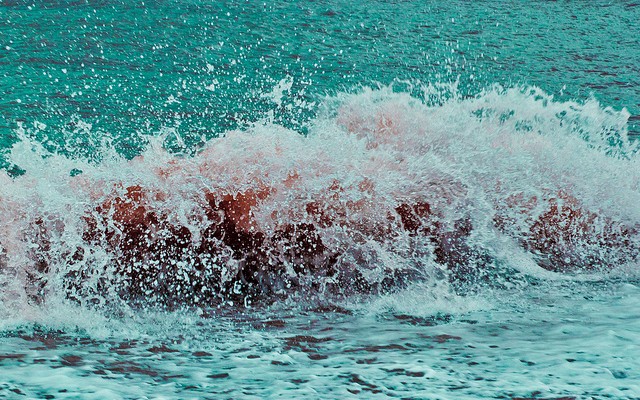To a kid, waves look huge. When I was young, I would stand chest-deep in the ocean, feeling bold but anxious as each wave loomed; I would have just seconds to gauge how to react.
If it were an even swell, I’d push off from the sand and float up, letting the wave lift me like a figure skater. For a moment my body would fill with grace and power. I’d stretch out my arms and legs in an arabesque, then let the wave gently land me.
But if I saw the wave already breaking raggedly, I’d turn sideways, make myself smaller and let it slice past me. Or I’d dive under, feeling the water tug my hair and churn against my legs. Sometimes I’d misjudge and the wave would dump me, choking me with foam.
Literary discourse moves in waves. Sometimes the discussion is lucid and sparkling, and I wade in eagerly. Sometimes it’s murky and treacherous; I watch from the beach to avoid getting dragged. (Stay between the flags of polite consensus!) But I still want to be buoyed and thrilled by a force of nature. I want to be liked.
It’s gauche for a writer to admit to being externally motivated. We’re meant to tap some deep well of feeling, or write for the joy of the craft. Sally Field is still lampooned for her 1985 Oscar acceptance speech: ‘I’ve wanted more than anything to have your respect … you like me right now, you like me!’
But writing isn’t its own reward. Its slog is hidden in bleary, lonely hours, and is rarely well paid. I do feel professionally proud when I look back over my writing and find it fluent and quietly authoritative. But that’s not why I want others to read and like it. Rather, the intellectually exhausting process of producing it has left me feeling so heavy that I crave that lift, that moment of lightness.
Not long ago I was discussing this with Anthony Morris, my co-author on the romantic comedy novel The Hot Guy. ‘Status and prestige are valuable to me, so I like any time someone praises my work or I get an opportunity to do my work in public,’ I said. ‘I get so despondent thinking that nobody notices my work.’
‘As a middle-aged white man, I have loads of status just by existing,’ Anthony quipped. And he’s right. Women are socialised to anticipate and prioritise the desires and opinions of others. John Donne may have insisted no man is an island, but he failed to recognise that emotional self-sufficiency is very much a male privilege. So is the ability to separate being polemical on the page from being personally disagreeable.
Writing at BuzzFeed, author and publisher Emily Gould argues women in publishing don’t have this luxury. Gould – whose early career at Gawker was dogged by accusations of indulgent self-revelation – recounts being amazed by an aloof female author at a 2005 PEN gala. She knew that such behaviour can carry professional penalties for a woman. ‘Being an extremely social, sociable, accessible person should not be the price of being a professional writer,’ Gould writes, ‘but for women it almost inevitably is.’
In an essay for Kill Your Darlings, surfer Erin Hortle recounts how, in the macho sexism of surf culture, big, harsh waves are for men; small, soft, reef-protected waves are dubbed ‘Squealers’ because apparently ‘girls’ can’t help making high-pitched cries of excitement when they catch one.
Hortle tells of her decision to surf a tough island break in Indonesia to show up some dickhead she met there: ‘you couldn’t wipe the grin off my face when I surfed past him, hacking at the wave and sending an arc of spray in his face.’ Still, her victory was hollow, ‘because I hated – I hate – the fact that, as a female surfer, you continually have to prove yourself in the water (or out of it). Over and over again.’
I read Hortle’s essay and thought to myself: I’m a squealer. I’m a fucking squealer. If I were a better, bolder writer, I wouldn’t just be lifted by literary discussions, I would carve them. Finding exhilaration in gentle boosterism feels like a capitulation to low gender expectations. But then I remember the emotional fragility of some male writers I’ve seen getting praised on social media – and the vicious abuse that some female writers endure simply for refusing to be likeable.
Is it enough that I keep getting in the water?
What galls Gould is the literary scene’s unwillingness to decouple admiration for women’s ideas from women’s perceived amiability. You shouldn’t have to bake cookies for your own book launch, ‘but when you see your peers doing this and it seems to be working, it’s hard not to feel like that’s the standard we’re all being held to’.
I can’t bake for shit. But I sift and stir and knead myself into my work, and I’m not self-raising. So when that wave of liking lifts me up, I feel completely delicious.
Image: ‘Waves’ / Chris Wells
Read the rest of Overland 226
If you enjoyed this piece, buy the issue




